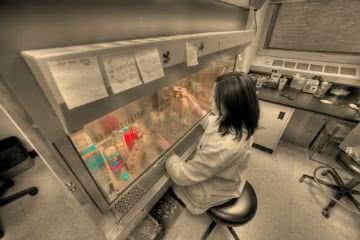Atvitamins from complex B are a group of water-soluble vitamins (soluble in water), which generally act as coenzymes (substances necessary for the functioning of certain enzymes). These vitamins, as well as other existing ones, must be included in our diet, and their lack can cause health problems.
The B-complex vitamins have a specific number and name. Are they: vitamin B1 (thiamine), vitamin B2 (riboflavin), vitamin B3 (niacin), vitamin B5 (pantothenic acid), vitamin B6 (pyridoxine), vitamin B7 (biotin), vitamin B9 (folic acid) and b12 vitamin (cobalamin).
read more: Importance of vitamins - organic molecules obtained by our body via food
Characteristics of B-complex vitamins
They are vitamins that are part of the group of water-soluble vitamins, just like the Vitamin C. Vitamins from this group are not stored in large quantities in the body., and therefore its intake must be daily. Among the foods that have them, we can mention: brewer's yeast, whole grains, green vegetables, eggs, meat, and fish.
The functions performed by the B-complex vitamins are many, and, generally, they act as coenzymes in the activation of different metabolic processes. They act, for example, as a coenzyme in fat synthesis, glycogen and amino acids. As they participate in different processes, their lack affects different parts of the body. Some of the symptoms of B vitamin deficiency are: fatigue, anemia, irritability, and injuries to the skin.

B vitamins
There are several vitamins that make up the B complex, all of which are important for the proper functioning of our body. Let's talk more about each of them below, emphasizing their functions in the human organism, at food sources where they can be found and also at consequences of your disability.
Read too: Vitamins used in cosmetics
Vitamin B1 (thiamine)
It was the first vitamin to have its chemical structure described. It acts as a coenzyme in CO removal2 in organic compounds, is important in the synthesis of fatty acids, and participates in the transmission of the nerve impulse. Vitamin B1 is important for the good functioning of the nervous system It's from system ccardiovascular.
Your disability can cause beriberi, a disease that can lead to death if not properly treated. Symptoms of beriberi include: fatigue, loss of appetite, nervousness, difficulty sleeping, among others. In more severe cases, the person will develop tingling, difficulty breathing, cardiac dysfunction, and even death.
Thiamine can be found in a lot of foods. Among the foods that have it, we can mention: yeast, whole grains, nuts, wheat bran, vegetables, eggs, fruits, and meat.
Do not stop now... There's more after the advertising ;)
Vitamin B2 (riboflavin)
É FAD coenzyme component (Flavin and Adenine Dinucleotide) and FMN (Flavin mononucleotide), being important for energy metabolism. This vitamin helps prevent diseases such as cataracts and maintain the skin. It also has an important role in the formation of Red Cells.
Riboflavin deficiency is considered common, but there is no specific name given to it. Its lack causes: lips and tongue lesions, and seborrheic dermatitis. Riboflavin can be obtained from foods such as: milk and dairy products, meat, eggs, and green leafy vegetables.
Vitamin B3 (niacin)
act as precursor of coenzymes NAD (Nicotinamide and Adenine Dinucleotide) and NADP (phosphorylated form of NAD), essential for energy production reactions for the cell. The coenzymes NAD and NADP are also important in the synthesis of some hormones and in the metabolism of carbohydrates, lipids and amino acids. This vitamin promotes a proper functioning of the immune system and the nervous system.
Niacin deficiency can cause an illness known as pellagra — responsible for triggering the triad: insanity, diarrhea and dermatitis. It is worth noting, however, that the triad is not always fully presented. Niacin can be found in foods such as: red meat, fish, milk and dairy products, eggs, yeast, whole grains, and some vegetables, such as broccoli and carrots.
Vitamin B5 (pantothenic acid)
It is a component of coenzyme A, it is therefore important in energy release reactions. This vitamin also participates in lipid metabolism and helps in the formation of red blood cells. Also features paper in maintenance of cartilages.
Lack of it can cause: fThesay, numbness and tingling sensation in hands and feet, and muscle weakness. This vitamin can be found in several foods, such as: meat, cereals, tomatoes, broccoli, offal, and egg yolks.

Vitamin B6 (pyridoxine)
It works like coenzyme in amino acid metabolism, being related to the synthesis of neurotransmitters and gluconeogenesis (production of glucose based on non-carbohydrate substances). It is important in prevention against heart disease, and it also helps to maintain the proper functioning of the nervous system and the immune system.
A deficiency in this vitamin can trigger: inflammation in the mouth and tongue, irritability, and mental confusion. The most severe deficiency of it can cause normocytic and normochromic anemia (in which the size and concentration of cells are preserved). Vitamin B can be found in foods of animal and vegetable origin, and its presence is observed in: brewer's yeast, whole grains, soy, nuts, offal (such as liver), and beef hen.
Vitamin B7 (biotin)
It is important for the functioning of certain enzymes, being found in fatty acid synthesis, gluconeogenic pathway, and amino acid catabolism. It also plays a role in regulating gene expression.
Her deficiency can cause desquamation of the skin and neuromuscular disorders. Vitamin B7 is mainly found in beef liver, and also in other foods in smaller quantities, such as: cereals, fruits, and meats.
Vitamin B9 (folic acid)
It acts as a coenzyme in the metabolism of nucleic acids and amino acids, and is therefore important in metabolism of proteins and in the synthesis of DNA. Her absence can provoke anemia and birth defects, the latter being the reason why supplementation with folic acid is recommended for women who intend to become pregnant (two months before) and in the first two months of gestation.
This vitamin can be found in foods of animal and plant origin, such as: dark green leafy vegetables, offal, whole grains, peanuts, and eggs. Wheat and corn flours in Brazil are enriched with folic acid.
Vitamin B12 (cobalamin)
It participates as a cofactor for enzymes related, for example, with the metabolism of amino acids and fatty acids. This vitamin is also associated with production of nucleic acids and of red blood cells and with the absorption of folic acid.
B12 deficiency, which is usually related to health problems that lead to malabsorption of this nutrient, can cause pancreatic insufficiency, hematologic and neurological complications, tooth loss, and pernicious anemia — typical of this lack.
This vitamin is obtained through the ingestion of foods of animal origin, such as: fish, seafood, meat, milk and dairy products. Restricted vegetarians may be deficient in it as it is not produced by vegetables.
Read too: Recommendations for healthy eating
By Vanessa Sardinha dos Santos
Biology teacher


